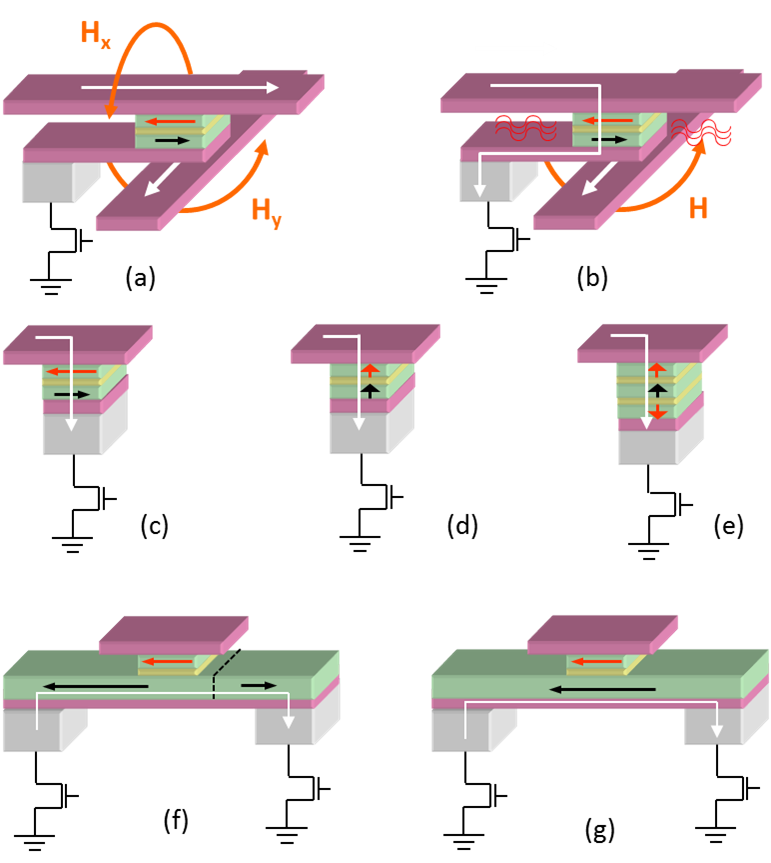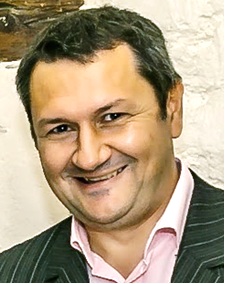Thematic overview
Magnetic Random Access Memories (MRAM) is a non-volatile memory technology, where information is stored by the magnetization direction of magnetic electrodes, very similar to computer hard-disk drives. The goal for MRAM memory is to simultaneously achieve high-speed read/write times, high density and unlimited cycling compared to other existing and emerging technologies.
Our group is developing advanced MRAM cell concepts patented at Spintec. The concepts are based on the use of temperature to reduce power consumption and increase the stability of the stored information. These ideas go beyond the conventional MRAM approach. The naturally occurring temperature increase during the write step is not lost, but is instead used to achieve the seemingly opposing goal of lowering the power consumption and increasing the thermal stability in the operating temperature range. Our group fosters young and experienced researchers developing/applying their expertise in the field of MRAM.

Questions to be addressed
Our main research axis is to use the naturally occurring temperature increase during the write step, when a current flows through the magnetic tunnel junction. The heating is used to go above a temperature threshold, making it possible to write the storage layer magnetization. This principle has been applied to in-plane magnetization cells using a storage layer pinned by an anti-ferromagnet and recently to perpendicular anisotropy cells. Our group’s goal is to demonstrate the proof-of-concept and then improve MRAM cell properties.
Our work involves the development of magnetic material systems, nano-fabrication (20-200nm cells), characterization of devices (magnetic & electrical) and simulation of the device behavior. Our activity in these vast fields is as follows;: On materials research, we are developing magnetic tunnel junctions with in-plane and perpendicular magnetic anisotropy. New electrode stacks having the material properties required by each specific concept need to be integrated in magnetic tunnel junctions, while achieving high levels of TMR signal. For the characterization of each concept we determine the write window parameters in terms of magnetic field, power consumption and magnetization reversal dynamics. Macrospin and micromagnetic simulation provide a better physical understanding of the system properties and the possibilities for optimization.
Projects
ANR EXCALYB – Perpendicular Anisotropy Materials for High-Density Non-volatile Magnetic Memory Cells
Crocus R&D – Thermally assisted MRAM
Samsung SGMI
Partners
Crocus Technology
Institut Néel
SP2M/NM
SAMSUNG
Applied Materials
SINGULUS
Recent news
- COMRAD – An H2020 ITN project [January 16th, 2020]
Overview COMRAD is an H2020 ITN projet (2020-2024). It will explore novel routes for the fastest possible and least dissipative magnetic switching in random access devices by bringing together the two disciplines of ultrafast magnetism and ... - Spintronic memristor based on an isotropically coercive magnetic layer [December 03rd, 2019]
We propose an original concept of spintronic memristor based on the angular variation of the tunnel magnetoresistance (TMR) of a nanopillar comprising several magnetic layers. We have experimentally developed the appropriate magnetic free layer and ... - Masters thesis projects for Spring 2020 [September 30th, 2019]
You find here the list of proposals for Master-2 internships to take place at Spintec during Spring 2020. In most cases, these internships are intended to be suitable for a longer-term PhD work. Interested Master-1 ... - GMR Heads oral history panel at the Computer History Museum [September 29th, 2019]
A GMR Heads oral history panel was held at the Computer History Museum, Mountain view, California, in May 2019. It celebrated the introduction of giant magnetoresistance (GMR) heads in hard disk drives in 1997, which ... - Seminar – Computing using magnetic random access memory (CRAM) and spin-orbit torque (SOT) memory cell [September 04th, 2019]
On Wednesday September 25 at 11:00 we have the pleasure to welcome Prof. Jian-Ping WANG (University of Minnesota, MN, USA). He will give us a seminar at CEA/IRIG, Bat 1005, room 445 entitled : Computing using ...

SOUSA Ricardo
ricardo.sousa@cea.fr

BALTZ Vincent
vincent.baltz@cea.fr

PREJBEANU Lucian
lucian.prejbeanu@cea.fr

DIENY Bernard
bernard.dieny@cea.fr





